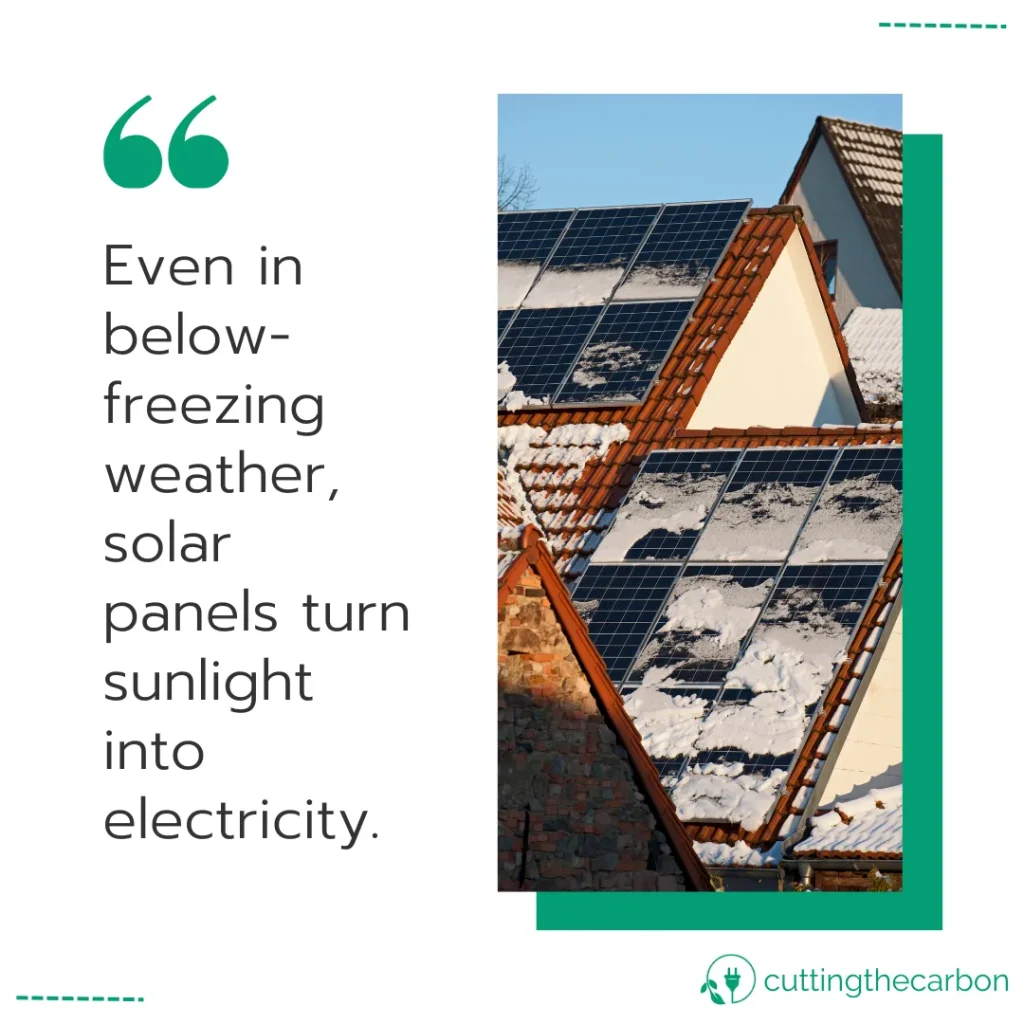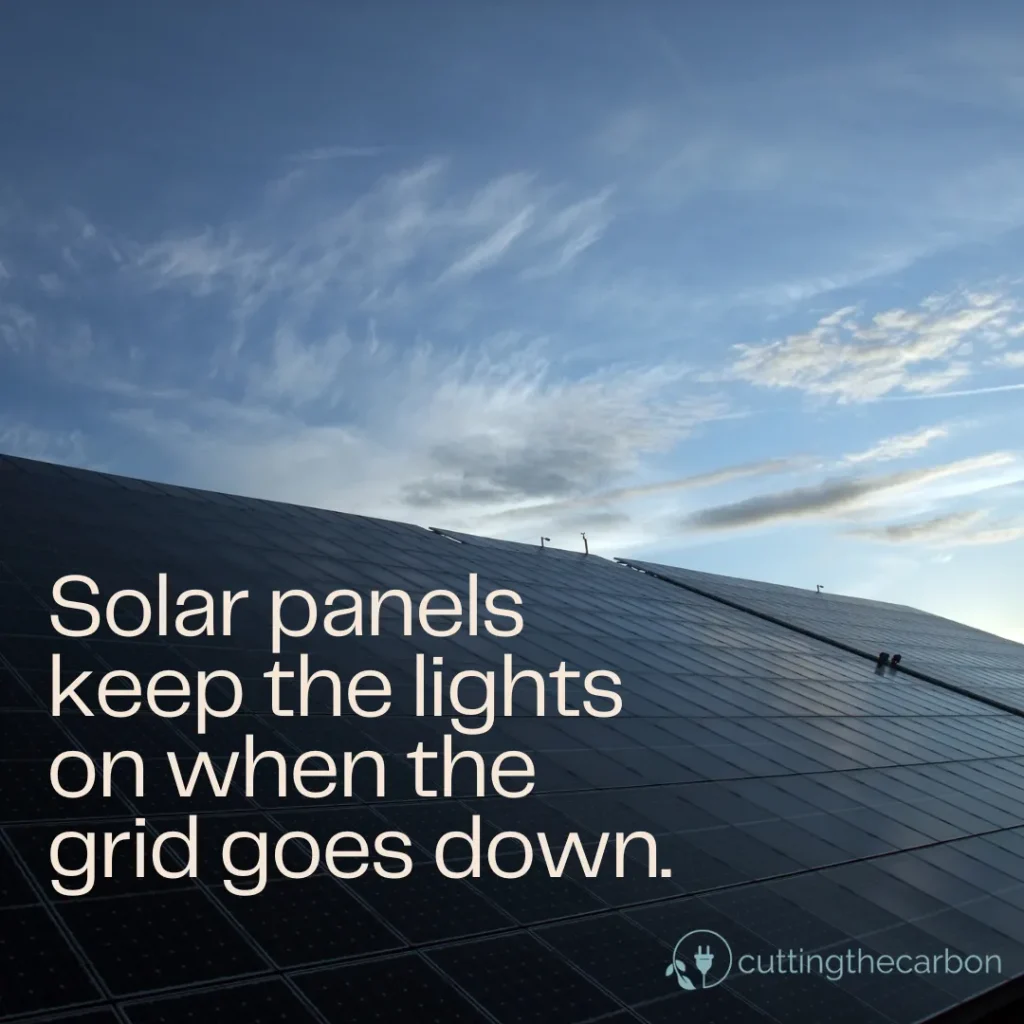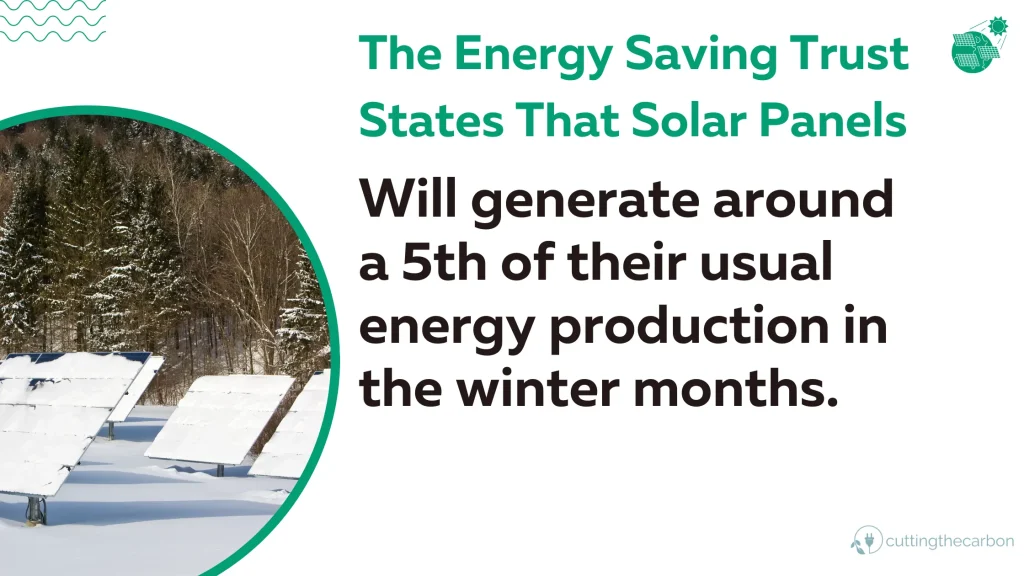Wondering do solar panels work in winter? Will they keep the lights on during Britain’s biting winters?
These modern marvels generate power from daylight, not just sunlight. This article sheds light on exactly how solar panels function in winter and how to optimise their performance.
Main Considerations:
- Solar panels can work in winter and generate electricity even on cloudy days.
- Cold weather can improve the efficiency of solar panels, as they convert daylight into electricity more effectively in cooler temperatures.
- Snow may temporarily halt electricity production, but most modern solar panel installations are designed to shed or melt snow quickly. Additionally, snow-covered ground can reflect extra sunlight onto the panels, increasing their energy production.
- Homeowners can optimise the performance of solar panels in winter by investing in solar battery storage to store excess electricity for later use and by taking preventive measures to prevent snow accumulation on the panels.

How Do Solar Panels Work?
Harnessing the power of daylight, solar panels provide an effective renewable energy solution in diverse climates, including those experiencing winter. At their core are photovoltaic cells, often made from silicon-based semiconducting substances.
These substances have a remarkable property: they stimulate electrons and create an electric current when light hits them. So how does this complex process unfold?
As daylight touches the surface of your solar panel system atop your roof, it interacts with the embedded photovoltaic cells activating electrons within these semi-conducting units.
The activated electrons start to move around, creating what we know as electricity. This electrical current is then captured by small conductive plates fixed on the sides of each cell and transferred to a larger electrical distribution box that powers your entire home.
Overcast days or cold temperatures won’t deter this power generation significantly because it relies on daylight rather than direct sunlight or heat for effectiveness.
Even with short days in winter or areas prone to cloud cover like Manchester or Leeds, these robust systems still generate enough electricity for household use – believe it or not.
They might even charge up a Tesla Model 3 sufficiently for nearly 18k miles of drive time annually. Oddly enough, cold conditions can increase efficiency since peak temperature may cause some energy loss due to overheating components – so places like Alaska and Antarctica could tap into substantial amounts of solar radiation despite extreme weather conditions.
With such brilliant design and functionality at hand, adopting solar PV seems less than just a sustainable lifestyle choice; it’s possibly one step towards ensuring long-term savings on energy bills while actively participating in an energy transition towards sustainable solutions.
Do Solar Panels Work In A UK Winter Video Explanation
The Impact of Winter on Solar Panels
Winter can significantly impact the performance of solar panels due to cold weather, snow accumulation, and shorter daylight hours.
The Effect of Cold Weather
However, contrary to popular belief, colder weather can significantly boost solar panels’ efficiency. Solar PV cells convert daylight into electricity more effectively in cooler temperatures.
While shorter winter days and lower sun positioning may reduce the amount of energy produced, low-temperature conditions aid in keeping your rooftop solar panel system running optimally.
High peak temperatures can cause a decrease in voltage, leading to an overall decline in power generation. Hence, a chillier climate is ideal for maintaining high solar panel performance levels.
Moreover, some homeowners might experience what’s known as the ‘albedo effect‘. It happens when sunlight reflects off the snow on the ground onto your under-performing panels, indirectly improving their energy production rates during frosty periods.
Therefore, despite common perceptions of cold weather hindering renewable energy solutions such as household solar installations, these resilient systems continue functioning efficiently even through the UK’s chilly winters.
| Attribute | Information |
|---|---|
| Power production | Winter’s contribution to power generation is less significant than summer’s. |
| Surplus power | Due to solar panels’ steep incline and smooth glass surface, snow doesn’t remain on them for long. |
| Expert installers | The melting snow off the panels is a natural cleaning service and enhances efficiency. |
| Snow adherence | Expert solar technicians consider local weather patterns and design systems to compensate for adverse weather conditions. |
| Warming effect | The melting snow off the panels acts as a natural cleaning service and enhances efficiency. |
| Benefits of snowfall | Solar panels perform better in cooler temperatures due to increased electrical conductivity. |
| Performance efficiency | Cleaning snow off solar panels is not advised due to potential risks of injury or damage to the panels. |
| Cleaning advice | The high production compensates for the slight reduction in production due to snow during summer days. |
| Negligible impact | The dark silicone cells of solar panels absorb sunlight’s heat, leading to snow melt when exposed to the sun. |
The Effect of Snow
Snow often instils doubts about the performance of solar panels and whether they will continue to work properly. Don’t let it deter your sustainable energy pursuits. Indeed, snow-covered panels can’t absorb sunlight to generate electricity, leading to a temporary halt in production.
But don’t worry. The design of most installations and residual heat from the panel’s surface usually ensures prompt snow shedding or melting.
Modern solar technology doesn’t shy away from cold climates – quite the contrary, as these conditions are optimal for solar panel efficiency due to less energy loss through overheating.
While acknowledging weather patterns is crucial when considering rooftop solar panel systems, remember that even snowy regions like Wales and Scotland have significant successful solar investments powering households all year round.

Solar Panels and Cloudy Days
Solar panels can still generate electricity on cloudy days, although their efficiency may be slightly reduced compared to sunny days. This is because solar panels don’t rely on direct sunlight or heat to work but rather draw energy from daylight.
Even under cloudy skies, there is still enough diffuse or indirect sunlight for the photovoltaic cells in the solar panels to produce an electric current. While the light intensity may not be as strong as on a clear day, modern solar panels are designed to work reasonably well even in cloudy weather.
So, you can still count on your solar panel system to contribute towards your household energy consumption and reduce your electricity bills, even during overcast days in the UK.
The impact of snowy weather on solar panels is different, though. When covered with snow, solar panels cannot absorb light effectively and, therefore, cannot generate electricity efficiently.
However, it’s worth noting that snow doesn’t usually stay long on the surface of solar panels due to residual heat generated by their operation.
Additionally, many roof-mounted PV systems have an angle that allows snow to slide off easily when it starts melting.
So once the snow has cleared from your solar panels or if you use reflective glass or install cleaning racks to remove snow build-up during winter easily, they will resume efficiently generating clean, renewable energy.
Some Key Solar Stats In Table Format
| Attribute | Description |
|---|---|
| Capacity | Home-based systems usually have a capacity between 1 kilowatt (kW) and 5kW. |
| Common Power Consumption | A solar array of 3kw or 4kw can adequately power a household of four or five. A 2kw or 3kw array is suitable for a smaller dwelling. |
| Power Generation | A 4kw setup can produce approximately 3,400kWh of electricity each year. |
| Power Consumption Examples | 4,857 hours of laundry machine usage, 97,143 hours of refrigerator operation, 1,880 hours of kettle boiling, 1,417 hours of oven usage. |
| Predicted kWh Output | A 1kw system can generate around 850 kWh annually, a 2kw system 1,700 kWh annually, and a 5kw system 4,500 kWh annually. |
| Average Household Consumption | The Energy Saving Trust (EST) suggests that a standard three-bedroom house in the UK consumes slightly over 3,000 kWh annually. |
| Production Influencing Factors | Factors such as the system’s size, its orientation, the angle of the roof, and the seasons can impact energy generation. |
| Electricity Tracking | Solar panels are equipped with a meter that monitors the electricity generated and fed back to the grid. Performance can also be monitored via online apps. |
| Upkeep | Solar panels need periodic cleaning and monthly inspections to maintain peak performance. |
Overcoming Winter Challenges
To overcome the challenges of winter, homeowners can invest in solar battery storage to store unused electricity for later use. Additionally, preventing snow accumulation on solar panels ensures optimal performance throughout the season.
Solar Battery Storage
Solar battery storage is a crucial solution for maximizing the benefits of solar panels, especially during the winter months in the UK. With solar battery systems, any excess electricity generated by your panels can be stored and used later when sunlight is scarce.
This means you can still rely on clean and renewable energy to power your home, even on cloudy days or long nights. By investing in a solar battery system, you not only reduce your reliance on grid electricity but also have a backup power source during outages.
It’s an efficient and sustainable way to make the most of your solar panel investment while reducing your carbon footprint.
Preventing Snow Accumulation
Snow accumulation on solar panels can reduce their efficiency and hinder electricity production. Here are some effective ways to prevent snow from accumulating on your solar panels:
- Tilted Installation Racks: Solar panel installation racks are usually tilted to allow snow to slide off naturally. This prevents the buildup of snow and ensures optimal performance.
- Light Dusting Disappearance: In most cases, a light dusting of snow will blow off or disappear rapidly due to the dark, reflective glass of the solar panels, which accelerates snow melt.
- Snow Reflectivity: Snow on the ground can benefit solar panel performance by reflecting extra sunlight onto them. This increases their electricity production even during snowy conditions.
- Snow Removal: Remove excessive snow from your solar panels using a soft brush or broom with an extended handle. Avoid using sharp tools or applying excessive force that may damage the panels.

Solar Panels and Property Valuation
Do solar panels bring about a noticeable increase in the value of homes in the UK? Solar panel installation not only reduces energy costs but also adds to the attractiveness of a property to prospective buyers, thereby positively influencing the property’s market value.
Do Solar Panels Work In Winter? Final Thoughts
Solar panels can indeed work in winter and on cloudy days. They draw energy from daylight, not just sunlight or heat. While they may generate less power in these conditions, advancements in technology have made them increasingly efficient.
Adding a solar battery system can further optimise their performance by allowing homeowners to store and utilise excess electricity even after the sun sets. So, don’t let the cold weather discourage you from considering solar panels as a sustainable and economical energy solution for your home.
Start harnessing the power of the sun today.
FAQs
Do solar panels work in winter?
Yes, solar panels can still generate electricity during the winter months. While their efficiency may be slightly reduced due to shorter daylight hours and potential obstructions like snow or ice, they can still harness sunlight and convert it into usable energy.
How do solar panels perform in cold temperatures?
Solar panels perform better in colder temperatures as compared to extremely hot conditions. Cold temperatures improve the conductivity of electrons, which leads to a more efficient flow of electricity through the panel’s cells.
What happens if there is snow or ice on my solar panels?
If your solar panels are covered with a thick layer of snow or ice, their ability to generate electricity will be temporarily hindered until the obstruction melts or is removed manually.
However, it’s important not to forcefully remove any accumulated snow or ice, as this could damage the delicate surface of the panel.
How can I ensure maximum efficiency from my solar panels during winter?
To ensure maximum efficiency during winter, keeping your solar panels clean and free from debris, such as leaves or bird droppings that may block sunlight, is recommended.
Additionally, considering adjustments for increased tilt angle can help shed off any accumulated snow more easily and maintain optimal performance throughout the season.
How much power will 300w of solar give in a UK winter?
On average, a 300W solar panel system in the UK can generate around 15-25% of its rated power output during the winter months. This means you can expect an average power output of approximately 45-75W per hour.
Do solar panels need sunlight or just daylight?
While daylight can help, direct sunlight is the most beneficial for solar power generation. The more intense the sunlight, the more electricity the panels can produce.
This is why solar panels are often installed in sunny locations and positioned to maximize their exposure to the sun.

